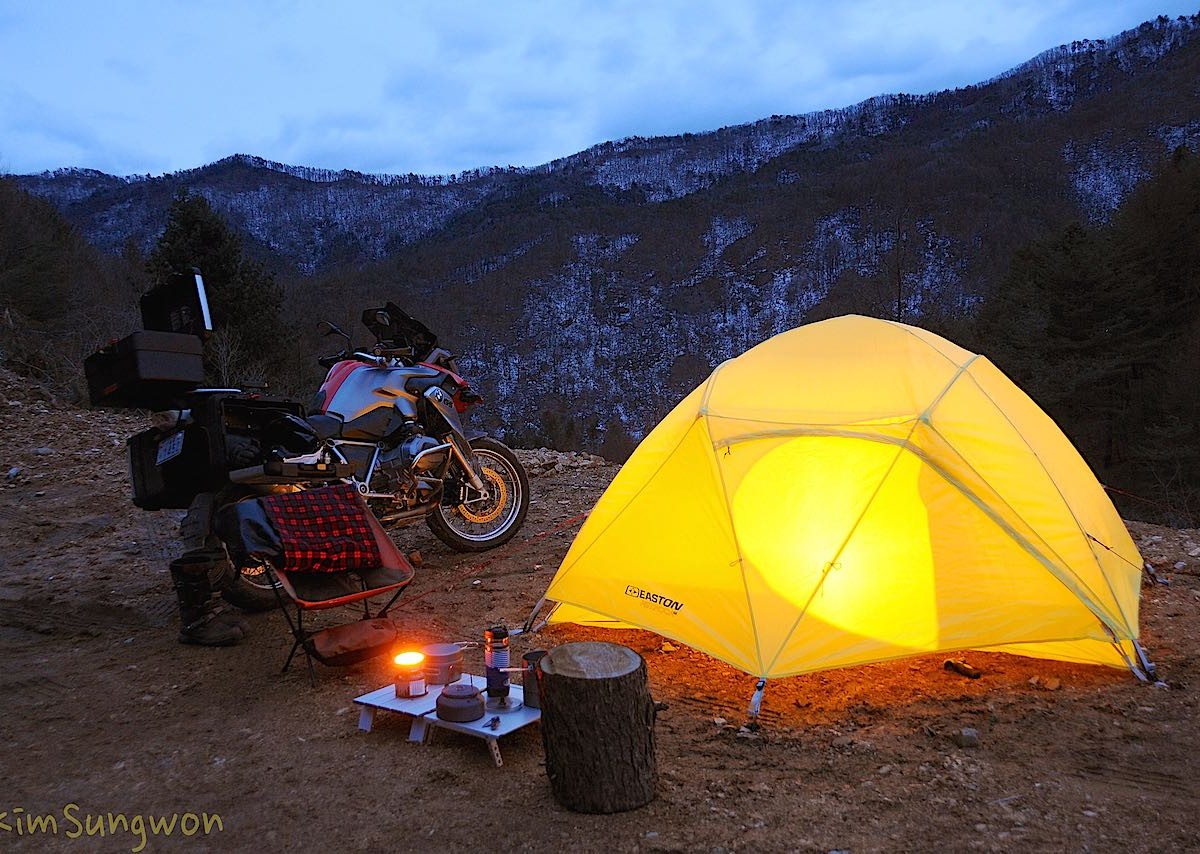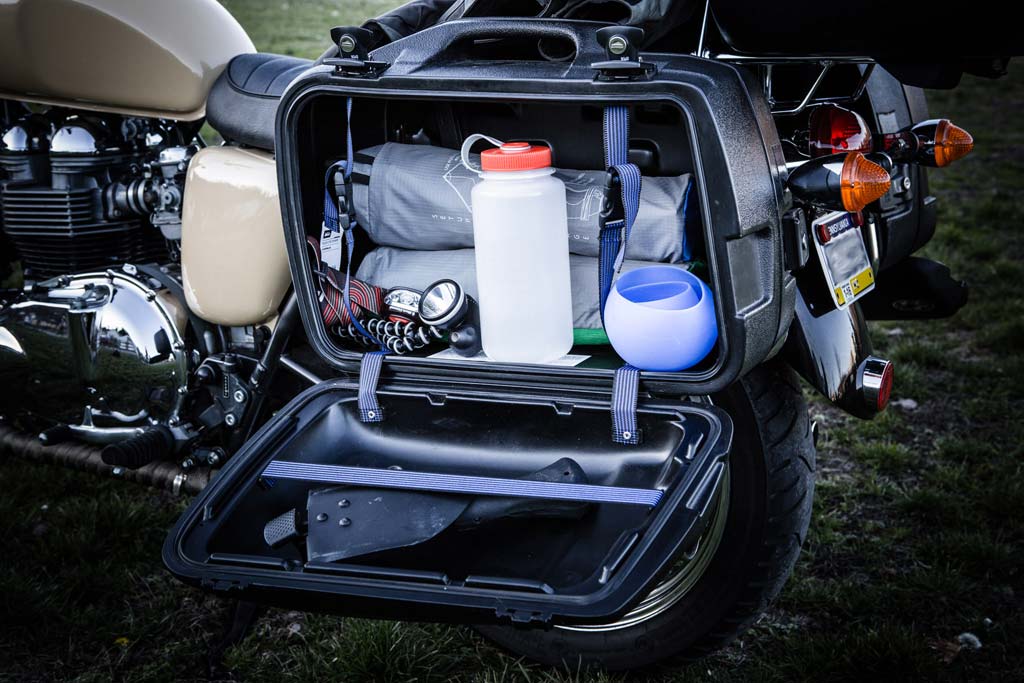
Motorcycle Camping - Find scenic rural highways and undiscovered campgrounds, pack light and enjoy the open world around you.
By Christy Karras Special to The Seattle Times, Courtesy The Seattle Times
The first time I contemplated motorcycle camping, I thought, “Why on earth would anyone want to do that?” After a day of riding, few things are more satisfying than a long bathtub soak and a fluffy bed. Why would I give those up?
But motorcycle camping is appealing in some of the same ways riding is: You can feel and smell nature, see the world around you without the barrier of a protective box, have a bit of adventure and maybe meet new people. And, of course, it’s cheaper and often more flexible than staying in hotels every night.
My motorcycle-book co-author, camping enthusiast Steve Zusy, likes the freedom of being able to stop for the night wherever he likes without the need for a hotel reservation — or even a town.
“Almost all campgrounds in the Northwest are suitable for motorcycle camping,” he said. Improvements and services can vary widely, so planning ahead is a must.
Camping options
For newbies or those who can’t live without creature comforts such as showers, Wi-Fi and electrical hookups, commercial campgrounds are one place to start. They’re often close to towns, amenities and attractions. But, targeted to the recreational-vehicle crowd, they can be loud and lack solitude.
National park campgrounds, amid some of America’s most treasured places, are easy to find and navigate and close to attractions and classic motorcycle-touring roads. But as Steve put it, “The campgrounds are usually huge, crowded and loud,” full of kids and RV generators that don’t align with the minimalist motorcycle aesthetic. They can also fill up quickly.

Striking a balance between accessibility and tranquillity, state parks often hit a camping sweet spot. Many are beautifully situated and rich in amenities, though you’ll have to research to find out which has what. Yurts or cabins might eliminate the need for a tent (but book early). Many, but not all, have showers and picnic tables.
They can fill up early during high season, especially on weekends, and your neighbors might be close by.
National forest or Bureau of Land Management campgrounds appeal to those who ride to escape civilization. While some are popular, you might snag a site at the last minute. Many are remote, with few amenities, and online information can be sparse or outdated. “Even if the website for the campground says it’s open, try to have an alternative in mind in case you get there and it isn’t,” Steve said. Bring extra water or a filter in case there’s no drinkable water.

Touring tips
Plan ahead. Try to imagine any possible situation. That includes big (what if the bike breaks down?), medium-sized (what if the weather gets worse?) and small issues (what will I eat?). You don’t want to be stuck without options in the middle of nowhere. If you don’t have a reservation, try scouting out campgrounds early in the day and staking your claim for when you return.
Dress right. Wear layers and stick with quick-dry fabrics. After starting off riding in jeans and cotton shirts, I was thrilled to discover merino-wool base layers, which regulate temperature, wick sweat and don’t stink even after I’ve worn them a couple (OK, maybe three) times.
Pack smart. Lay out all your gear and camping equipment and make a few editing passes, asking yourself if you really need each item. The more riders in your group, the more you can split the necessary gear between bikes. I’m a big fan of checklists.

Adapt the bike. Know your bike’s weight limits and how to adjust the suspension (pre-load, compression and rebound) for the additional load of extra gear. The suspension settings and added weight will also affect your bike’s handling. Bring a kickstand disk to add surface area to the bottom of your kickstand; we attach it to the bike so we don’t drive off and leave it behind. Make sure your tires have plenty of tread, and adjust tire pressure for the additional weight.
Be courteous. That includes entering and leaving as quietly as possible. “Not everyone will be as happy to see you as you are to be there,” Steve said.
Be aware of your surroundings, especially in more remote settings. You won’t have a vehicle for stashing items that attract bears and other predators. Smaller animals can also do a lot of damage while you’re asleep. Check campground information boards for notices of potential hazards including wildlife.
A few of our favorites
Some of our favorite bike-touring campgrounds around the Northwest, reached via scenic rural highways that are worth the trip:
Osoyoos Lake Veteran’s Memorial Park: Just south of the U.S.-Canada border at the Okanogan town of Oroville, it’s a great place for a last stop before heading north to Canada and a first night back in the U.S.
Seal Rock Campground, Olympic National Forest: On the eastern edge of the Olympic Peninsula, it features showers, easily accessible interpretive trails, and beautiful views of Hood Canal and beyond.
Lake Thomas Campground, Colville National Forest: Primitive tent sites are nestled on the eastern shore of Lake Thomas, just off Highway 20 about 17 miles northeast of Colville, Stevens County.
Blue Pool Campground, Willamette National Forest: Next to Highway 58, about 45 miles southeast of Eugene, Oregon, in an old-growth forest along Salt Creek, it’s lush, secluded and serene — a great way to end a day on the bike.
Clyde Holliday State Recreation Site, Oregon: Tall, willowy cottonwood trees along the John Day River provide shade and serenity off U.S. Highway 26 just west of the Eastern Oregon town of John Day. It’s open and flat, with easy access.
Christy Karras, of Seattle, is co-author with Stephen Zusy of “Motorcycle Touring in the Southwest” and “Motorcycle Touring in the Pacific Northwest.”
If you go
Costs for all kinds of campsites range from about $18-$40 a night; higher for yurts and cabins.
While drop-in campers are welcome anywhere as long as there’s space, it’s safer to reserve a spot.
• Washington State Parks: parks.state.wa.us
• Oregon State Parks: oregonstateparks.org
• Federal campgrounds (including national parks, national forest and BLM): recreation.gov
Christy Karras, of Seattle, is co-author with Stephen Zusy of “Motorcycle Touring in the Southwest” and “Motorcycle Touring in the Pacific Northwest.”